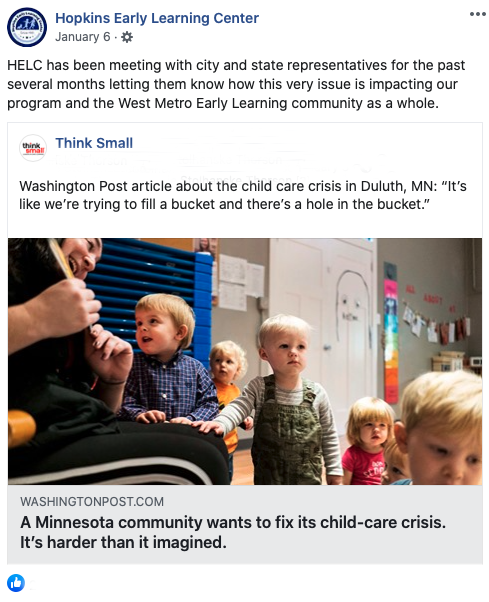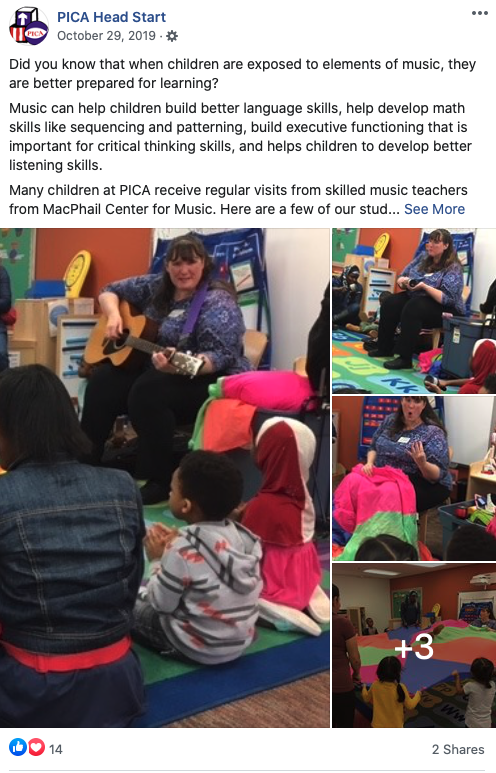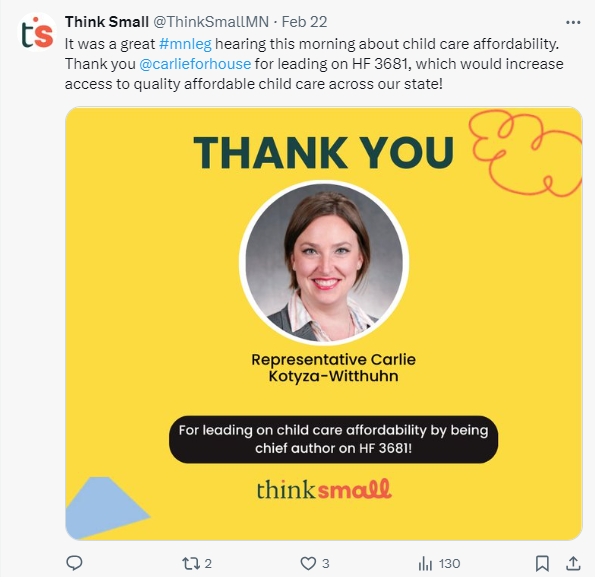Are you familiar with the world of likes, shares, and retweets? Want to use your social media savvy to make a difference in the early childhood education field? Whether you’re already a pro at Facebook and Twitter or just trying them out, there are great ways to use these tools to advance the early childhood profession.
Social media is extremely flexible. You can advocate on your own time, when you have a few minutes to write and share an idea. It is a creative space that allows you to try out different approaches. Use the suggestions below to get started or to spark ideas about how to engage in new ways. These suggestions mostly apply to Twitter and Facebook but may be useful for other formats as well.

Follow people and organizations that create messages you like.
By sharing and retweeting posts from others, you increase visibility of the field and amplify important ideas. Here are a few to get you started. More can be found at the end of this post.
MN Organizations
Think Small:
Facebook
Twitter (@ThinkSmallMN)
Great Start Minnesota
Facebook
Twitter (@GreatStartMN)
Children’s Defense Fund MN:
Facebook
Twitter (@cdfmn)
Minnesota Child Care Association:
Twitter (@MNChildCareAssn)
National Organizations
First Five Years Fund:
Facebook
Twitter (@firstfiveyears)
Harvard Center for the Developing Child:
Facebook
Twitter (@HarvardCenter)
The Heckman Equation:
Facebook
Twitter (@heckmanequation)
National Association for the Education of Young Children (NAEYC):
Facebook
Twitter (@NAEYC)
National Association for Family Child Care (NAFCC):
Facebook
Twitter (@nafcc)
Zero to Three:
Facebook
Twitter (@ZEROTOTHREE)
As you’re choosing who to follow, take a moment to examine whose voice might be missing. Challenge yourself to be more inclusive—geographically, racially, and ideologically. The field is both narrow and vast. The messages that resonate with you might not be the same as what resonates with others you are trying to bring along.
Share a photo or a lesson.
Many people don’t have a clear idea of what goes on in an early childhood education program. Share a photo of something your children are learning to illustrate what that looks like. (Be sure that you have consent from the parents or take a photo that doesn’t identify individual children). Or share a lesson for the day, week, or month. For people outside of the field, it’s important for them to have a better understanding of all the work that goes into a quality early childhood education program.

Did you just learn a new fact or surprising statistic about early childhood education? Share that with elected officials and others to spread the word.
You might already share this information with the parents of children in your program. Can you expand to share it with others? A specific example is also a great way to bring a larger discussion to a more personal level. What does social emotional learning look like in your family child care program on a Wednesday morning? How are you working on literacy concepts in the toddler classroom? These skills might be obvious to you, but they are not as recognizable to others. Take a moment to appreciate your work, name it, and share with others.
Make a video.
A short video might be even better at illustrating the skill you’re working on in your program. You don’t need fancy equipment—just use your smartphone. When the kids are gone, you could make a video tour of your space. How is it set up for learning? How does it take into account what children need? This is another way to tie into larger early childhood education ideas and policies.
You can also share your story in a video. Why did you choose to be an early childhood educator? What is rewarding about the field? What is challenging?
Tag elected officials.
If you’re advocating for a specific policy, it can be a good idea to tag your elected officials to let them know. However, this strategy is most effective when paired with personal meetings and contact with those legislators. Use caution when calling them out on social media alone. If you want to highlight what you’re doing in your program, tagging elected officials in your photo or video post can be a good way to do that.

Not sure who your elected officials are? Use this one page guide to find out and record their contact information. You can add their social media handles as well.
Another good way to engage with officials is to thank them or share the work they are doing for the field. If it’s your own official, thanking them for a policy win is always appreciated. Supporting national early childhood education champions is a good way to participate, also.
Organize your network around early childhood education advocacy.
Are you friends with other early childhood educators? Do you know other people who are active on social media and interested in the topic? Bring them together to elevate the topic or support a policy proposal.
Your network has power! You can organize around a specific bill, or plan a day to post about the early childhood education field. If you already celebrate the Week of the Young Child, add a social media advocacy component. National Child Care Provider Day, celebrated each year on the Friday before Mother’s Day, is another good time to highlight the profession. Do you take care of school-age children? A local school release day is a great time to remind people of your importance in the community. You can also organize a tweetstorm.
When it comes to Twitter, use a couple of hashtags to connect with other people discussing the same topic. We’ve included a few hashtag ideas here. On any platform, a photo, video, or graphic is generally more eye-catching than just words. The Heckman Equation and Zero to Three have some graphics and posts you can use.

Remember to have fun, be creative, and use the tools to connect with others.
Additional Links to Consider
Child Care Aware of America:
Facebook
Twitter (@ChildCareAware)
Child Trends:
Facebook
Twitter (@ChildTrends)
The Center for the Study of Child Care Employment (CSCCE):
Facebook
Twitter (@CSCCEUCB)
Council for Strong America:
Facebook
Twitter (@strongnationUSA)
Ready Nation:
Twitter (@Ready_Nation)
By Marie Huey, Public Policy and Advocacy Staff Leader








